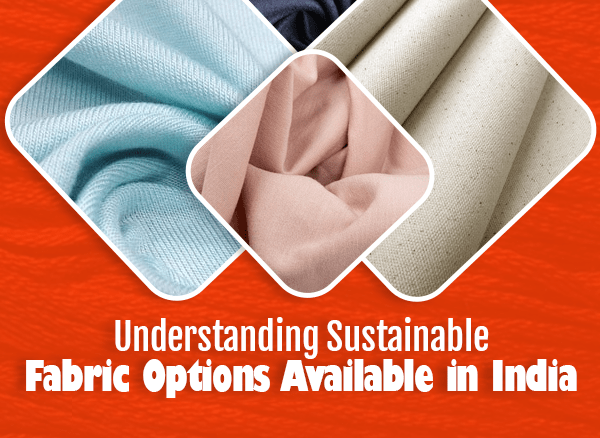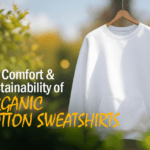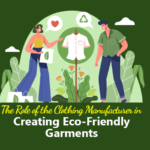Understanding Sustainable Fabric Options Available in India
Understanding Sustainable Fabric Options Available in India

In today’s generation of heightened environmental consciousness and sustainability, the search for eco-friendly choices extends to the textile industry. India, with its rich textile legacy, provides a variety of sustainable fabric options that are in line with eco-friendly practices. From organic cotton to hand-spun khadi and innovative materials like bamboo and Tencel, India showcases a tapestry of eco-friendly textile choices, each contributing to a more sustainable and ethical approach to fashion and fabric manufacturing. Here are several sustainable fabric options prominent in India:
Organic Cotton
India is a significant producer of organic cotton, offering a sustainable alternative to conventional cotton. The popularity of organic cotton continues to grow as consumers seek ethically produced and environmentally responsible products. Produced without synthetic pesticides or fertilizers, organic cotton minimizes environmental impact and promotes soil health. Choosing Organic Cotton Suppliers in India promotes a more sustainable and ethical fashion industry while supporting agricultural practices that prioritize ecological balance and social responsibility.
Khadi
Khadi fabric, which is hand-spun and hand-woven, is a significant part of India’s sustainable textile heritage. Its production promotes eco-friendliness and supports small-scale manufacturing. Khadi fabric is hand-spun and hand-woven, carrying forward a centuries-old tradition. Its production involves skilled artisans using manual spinning wheels (charkhas) and looms, showcasing a labor-intensive and artisanal approach to textile creation. It supports a more natural, low-carbon production process, preserving the environment and reducing industrial impact.
Bamboo Fabric
Bamboo is a fast-growing plant that requires minimal water, pesticides, and fertilizers for cultivation. It regenerates quickly and can thrive in diverse climates, making it a highly renewable resource. Bamboo fabric is made from bamboo pulp, known for its softness and breathability. Bamboo cultivation requires fewer resources and has natural antibacterial properties. It is known for its luxurious softness and smooth texture. It has a natural sheen similar to silk and offers excellent breathability, making it comfortable to wear, especially in warm climates.
Recycled Fabrics
Recycled fabrics come in a variety of forms, such as recycled polyester, recycled nylon, and upcycled textiles. These fabrics can be used in a wide range of products, from clothing and accessories to home furnishings and industrial applications; recycled fabrics can offer similar quality, durability, and performance as virgin materials, ensuring that the products made from recycled textiles maintain standards without compromising on functionality or style. These are becoming more and more popular as a means of reducing waste and conserving resources.
Hemp Fabric
Hemp is a durable and environmental friendly fabric made from the cannabis plant. Its cultivation requires minimal water and pesticides, making it a sustainable option. Hemp fibers possess natural antibacterial properties, preventing bacterial growth and odor, making the hemp fabric ideal for sensitive skin and reducing the need for chemical treatments. The cultivation of hemp for textile purposes has gained acceptance in many regions due to its industrial uses and eco-friendly characteristics.
Jute Fabric
Jute, known as the “golden fiber,” is a natural, biodegradable fabric made from the jute plant. It’s widely used in various textile applications due to its strength and sustainability. Jute fabric is biodegradable, meaning it decomposes naturally at the end of its lifecycle, minimizing environmental impact and reducing waste accumulation. The cultivation of jute supports rural communities and provides livelihoods to numerous farmers and workers involved in its production and processing.
Adopting these fabrics signifies a commitment to reducing environmental impact, supporting local communities, and fostering a more sustainable textile industry. Apparel Manufacturers in India provide sustainable fabric, and as consumers increasingly prioritize eco-friendly options, the exploration of the fabric choices in India represents a pivotal step towards a more conscientious and sustainable approach to textile production and consumption on a global scale.
Recent Posts
-
 The Comfort and Sustainability of Organic Cotton Sweatshirts
The Comfort and Sustainability of Organic Cotton SweatshirtsConcerning cozy and environmentally friendly apparel, eco-conscious consume...
Read more -
 How to Outsource Clothing Manufacturing: Exploring Pros and Cons for Small Fashion Businesses
How to Outsource Clothing Manufacturing: Exploring Pros and Cons for Small Fashion BusinessesWhen considering outsourcing clothing manufacturing, it's crucial to conduc...
Read more -
 T-Shirt Fabric Guide: What Is the Best T-Shirt Material to Wear?
T-Shirt Fabric Guide: What Is the Best T-Shirt Material to Wear?Choosing the right T-shirt fabric is crucial for comfort, style, and durabi...
Read more -
 What Is Slow Fashion & Why It's Important
What Is Slow Fashion & Why It's ImportantSlow fashion is a movement and approach to clothing and fashion that priori...
Read more -
 The Role of the Clothing Manufacturer in Creating Eco-Friendly Garments
The Role of the Clothing Manufacturer in Creating Eco-Friendly GarmentsThe role of clothing manufacturers in creating eco-friendly garments is piv...
Read more


